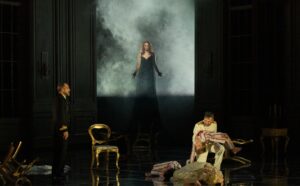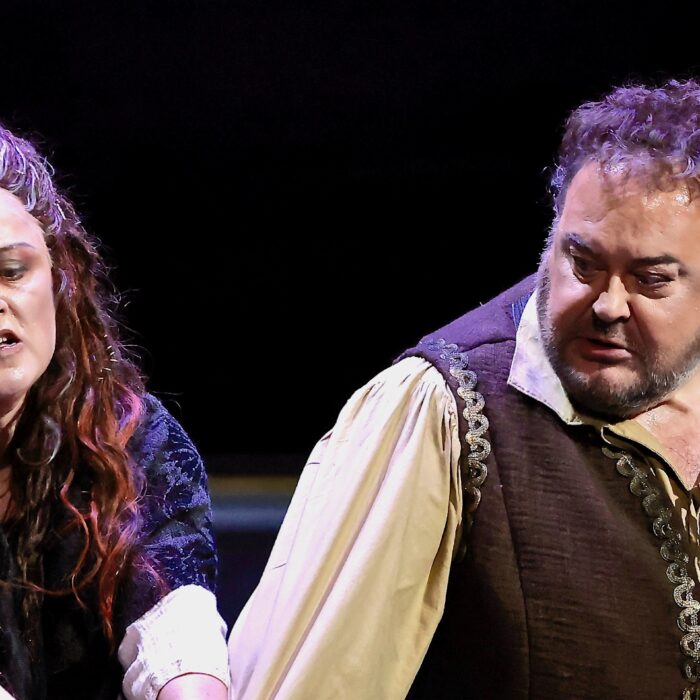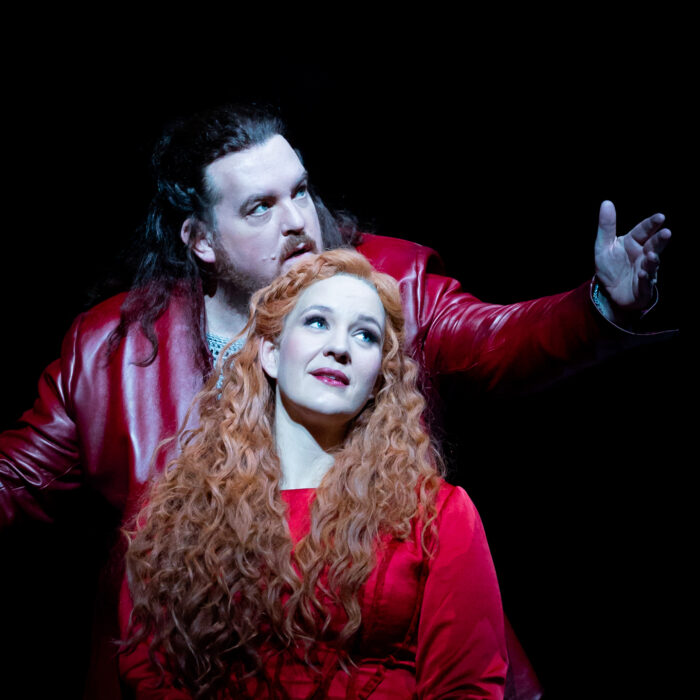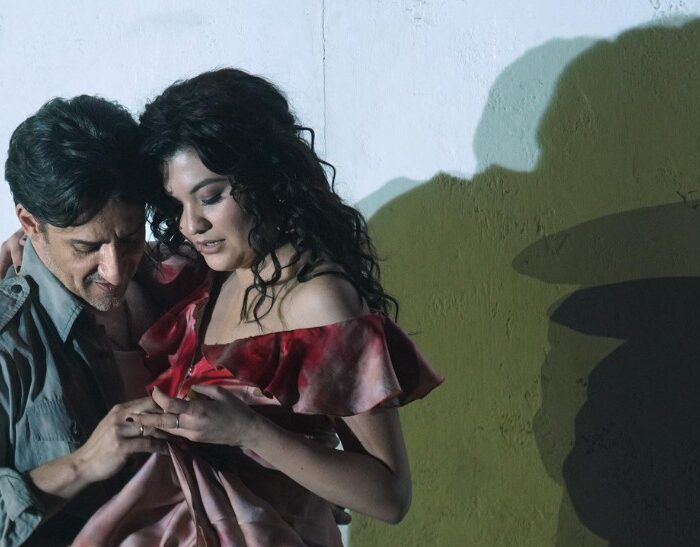
Opéra de Paris 2024 Review: Médée
By João Marcos CopertinoPhoto credit: Elisa Haberer / Opéra national de Paris
Paris Opera’s production of Charpentier’s “Médée” is not bad, but throughout the performance, operagoers will be filled with a sensation of uneasiness. It is not necessarily because of its murderous plot, but because the production feels unsuited to its musicians. It leaves one with the feeling of wearing a garment lent to us by a larger or thinner cousin so we can attend a fancy wedding. Although it fulfills the dress code, it is far from tailored dressing. An extremely vigorous and promising cast is forced to suit clothes and gestures that deny their capacities.
First things first: David McVicar’s production is not a Paris Opera original—it was both from the North of the Channel. First staged at English National Opera—a very different company—it was premiered by the great Sarah Connolly. Moreover, the transferring of the action to the Second World War perhaps seemed more logical a decade ago than it does today. The ballets’ emulating something from “Mrs. Henderson Presents” lacked the intended panache, and its criticism of war culture today sounds aloof or just naïve. The production seemed beneath the talents of McVicar, with Paris Opera’s resources at his disposal. While everything might sound glossy and proper for ENO, at Opéra Garnier, everything looked like an invitation to lower our dramaturgical expectations for the house. Using one single scenario for five acts—preserving the French Baroque theater’s unity of space and time—might be historically correct, but it feels too austere, even frugal, for Palais Garnier. The lightning was often a penury of colors. While the lower lights wisely amplified the bodies of the cast onto the scenario walls, most of the time, it just made the narrative visually unappealing.
However, the biggest dramaturgical failure was the production’s inability to frame what was this “Médée’s” biggest appeal: its mostly youthful cast and an auspicious orchestra (William Christie’s refined “Les Arts Florissants”). It seemed to me that William Christie’s musical conception was underpinned by a sense of vocal freshness in the cast and musical dynamism in the orchestra, the news of which did not reach the dramatical staff.
In fact, why did McVicar expect that the same scenarios that worked for the already mature Commander (and later Dame) Sarah Connolly would work for the fresh and rising star Lea Desandre? It is not a matter of competition—I am a great admirer of both singers—but one cannot expect Emma Stone to replace Merryl Streep in a film (or vice versa). Desandre, in her first title role at Paris Opera, exudes a sense of vitality and youthfulness unmatched by any other mezzo-soprano of her generation. The few times I have had the pleasure of seeing Sarah Connolly, I witnessed a great sense of musicianship and a visceral artist. Although both are great singers, their sets of skills are fairly distinct, and easily distinguishable.
McVicar placed Desandre next to children who might be two years away from being drafted by the NFL—and forced her to call them her children! Even my blind neighbor sitting in the highest balcony could tell that was an impossible family (this is no diss on the child actors who played their roles magisterially). There was a sense of uneasiness in attending the performance—as if McVicar could not acknowledge that, with such a young and fresh Medea, he should have explored her abilities to the point of dramatical exhaustion. After all, if Medea were as exuberant, youthful, and fair as Lea Desandre, why would Jason ever dare to ogle anyone else? To me, here lies precisely the dramaturgical possibility in Pierre (and later Thomas) Corneille’s text and even in Christie’s musical proposal: their Medea is not a cousin of Medusa, nor the unassimilated foreigner, but precisely the ideal women that for reasons beyond her control has, inexplicably, been refused by a lesser man.
However unsuitable the staging to its cast’s abilities, it is essential to register that the cast did not shy away from its challenges. Most of the singers of the performance are regular contributors to “Les Arts Florissants”; thus they do share a chemistry with each other that only comes through as a certain kind of musical intimacy. The lute of Thomas Dunford held musicians’ voices like the hand of God; the strings enveloped some scenes as I have never seen before. That musical intimacy, however, does not eliminate the risks that were taken in the night. They acted as if they had something to prove to the audience—and that is not a bad thing. For many, it was their debut in Paris Opera, and, in the case of Desandre, it was her first time singing a title role after gaining much sympathy with the audience singing gamin roles.
In Desandre’s Medea, we find a performance that works as “Médée et son double.” In the first half of the opera, until the third act tear-jerker of an aria, “Quel prix de mon amour,” Desandre is a sweet Medea, the most congenial of all women. Sporting a very 1940s wig, she emanated femininity and dramatism with all the resources that we know very well: her voice, extremely sweet and pretty, rings as a souvenir of true beauty—as if the beauty in her song is the sole reason for the existence of the sound. Her light mezzo instrument is fresh like dew. Her Medea, until then, was the most primaveral Venus singing an autumnal tune.
After her showstopping aria (“Quel prix…”), Desandre incarnated a second Medea revealing a facade of her artistry that has been, until now, unknown to the public. Her voice, otherwise tender and sweet, now is rounded and large. It was vibrant, powerful, but not dreadful or scary. In her incarnation of the second advent of the murderous mother, Desandre showcased a sportif side: she danced with the devilish dancers as a peer and moved in a serpentine way. Nevertheless, even in the final vengeful hour, Desandre was never a hateful figure. Her voice carries a certain kind of smoothness that is hard to describe. The sound has no edges; her Medea was the most endearing of all assassins.
The main issue is that, for a number of reasons, Desandre’s Medea still preserves an amiable factor. She is not like Bette Davis in “Of Human Bondage,” where we love to hate her. Desandre’s vocal work goes against the grain; the quality of her work manages the impossible, leading us to deny any sympathy to any character other than her. In that sense, Desandre’s Medea reaches the perfect impasse of French Baroque Tragedy: where justice and affection battle each other to an unsolvable situation. Corneille knew how to do that better than anyone. His plays often lead us to impossible moments where the audience cannot find an agreeable solution (I personally recommend reading his “Horace” and “Le Cid” after seeing this “Médée”). While McVicar’s staging seemed to have done only half a job, Desandre shifted the situation for the better.
Reinoud Van Mechelen, another frequent collaborator of Les Arts Florissants, was, intentionally, a very unpleasing Jason. His voice, always well-projected and metallic in a way that only French tenors can be, was well-suited to Charpentier’s musicality. Nevertheless, his movements were perhaps too histrionic. It is hard to believe we are seeing the Jason who fought with the alliance troops in the war. In fact, the whole political plot was, to me, particularly senseless—Jason is abandoning Medea on what political grounds? It was hard to see, even with binoculars from the first row. I could see only that they were all allies, soldiers from different armies (French, American, and English)—and nothing more.
Ana Vieira Leite had the most splendid Paris Opera debut I have seen this season. Comfortable in her element, her voice has perhaps gained some edges compared to what it was a few years ago—but was extremely suited to her character. While her Creuse is sympathetic, Leite’s biggest achievement was an immense capacity to sing along with the orchestra with such a quality of phrasing that reminded us that, in baroque music, the voice is a wind instrument. Her attentiveness to the orchestral sounds was such that even in moments when Christie delayed the tempi more than perhaps is usual, she still stood tall—until her death.
Full disclosure: I am one of the biggest fans of Laurent Naouri, especially in recitals. In opera, he often plays terrible caricatures of tyrannical patriarchs. Although I deeply appreciate his vocal work, his lower notes might be a bit shier than they used to be, and his French, more chewed. That said, Naouri is an actor who truly immerses himself in the theater—and who has very strong comic instincts. In one scene of the opera, however, such comic timing felt a bit off. When Medea enchants Creon with an incestuous vision where father and daughter join together as man and wife, McVicar seemed tastefully to reveal part of the nature of Medea’s power. Her witchcraft might not come simply from the deepest hell, but from an extroversion of the most secret and intimate of inclinations. The truthfulness of this revelation clarifies much of Créon’s character and that of his daughter. Naouri, instead of playing it seriously, sought some kind of humor in that scene, which otherwise, would have been the most terrific terror. Although it might have been pleasing to some, it felt as if someone were breaking the potential fullness of the theatrical experience—something unusual for Naouri.
Gordon Bintner undertook the role of Oronte with much dignity. The character who is usually played as a petty war hawk, had a sense of masculinity and dignity as the unrequited lover that made him even likeable. His baritone voice resonated well, and his French was extremely proper.
Julie Roset’s Amour was a privilege to hear. I must say that I really did not enjoy her characterization as a vaudeville singer—if felt off and demeaning to a certain ethereality in Charpentier’s elevated music. In fact, all of the choreography in the first two acts was simply vulgar, meant to convey a thoughtless idealism about the war and the past. However, Roset can sing—and she can sing very well. Her smooth voice is a showstopper, and it reminded us to listen to music just for its own sake.
The cast was filled by a great troupe of singers that performed in the minor roles. They were all in good form, contributing to the grammar of lyrical tragedy.
After all, McVicar’s take on “Médée” was oblivious to precisely those things that made this production remarkable: the vigorous youth of its cast; the complex appeal of Lea Desandre as the murderous mother; and the great musicality of its orchestra. Few stage directors are so accomplished as McVicar nowadays, and even fewer are such keen operators of the machine of the great opera companies: the evidence shows what a team player he is (from his Met Zefirellian “Tosca” to his Paris Opera’s “Adriana Lecouvreur” and ROH’s “Salome”). I was nothing, if not surprised, to witness a mishap that seemed below Paris Opera’s usual high standard of stagings. That said, what music! And what musicians! I personally took to heart how great the execution of the last three acts were. Charpentier’s “Médée” is not for everybody—it is certainly not as accessible as his “David et Jonathas”—, but its few disciples will certainly have a nice time.


